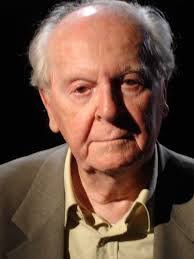César Covo (1912-2015)
The last known International Brigade veteran in France, César Covo, died in March in Rennes, France, just a few weeks from his 103rd birthday. His death marks the silent turning of a historic page as he was most certainly the last surviving IB veteran of the battle of Madrid.
Born in Sofia, Bulgaria in 1912, his family immigrated to France in 1930. An active member of the French Communist party, he headed to Spain in October 1936 and joined the Balkan company of the Thaelmann battalion of the XII IB, participating in the defense of Madrid in November 1936, as well as other battles around the capital.
Of Sephardic origin, upon arriving in Spain he spoke Ladino, French, Bulgarian and a bit of Russian. Ladino is the language that many Sephardic Jewish families retained after their expulsion from Spain in 1492, in the same manner that Yiddish is the traditional household language in many Jewish families of Central European origin. To the Madrileños of 1936 Ladino sounded archaic, but Covo immediately took to contemporary Spanish. In January 1937 while attending a training course for cadres, he was noticed for his linguistic abilities and military knowledge, having completed his service in France prior to departing to Spain. The Russian advisor who had led the training course transferred Covo with him to the 1st Mobile Brigade of the 46th Division, under the command of Valetín González, El Campesino. Seriously wounded during the battle of Guadalajara in March 1937, Covo spent the next year and a half in Spanish and IB hospitals including, the Hotel Palace in Madrid, Murcia and Mataró.
Repatriated in late 1938, a year later he was again called up for service in the French army despite his debilitating limp. An angry army officer countermanded the doctor’s decision at the induction center stating: “If you could fight for Spain, you can fight for France.” Managing to escape capture following the debacle of 1940, he later joined the FTP MOI (Franc Tireur Partisan Main d’Oeuvre Immigrée) branch of the French Underground where he turned to his printing trade and worked in the static yet fundamental role as a forger of official papers and documents. On the morning of August 25, 1944, having heard of the approach of the Allies, he found his way from the working class suburb of Saint Ouen, on the outskirts of Paris, to the rue de Rivoli in the center of Paris. There, he had the uncanny luck to once again hear Spanish. In an interview, he recalled witnessing the attack on the Hotel Meurice, headquarters of the German commandant of Greater Paris, General Von Choltitz, where from under the arcades he distinctly perceived the Spanish Republicans of the Leclerc Division calling to each other during the assault.
He published a memoir of his time in Spain, La Guerre, camarade! in 2005 (Biarritz: Atlantica). His experience was indeed extraordinary in several ways, and not only the fact that he participated in and survived one of the epic moments of the International Brigades in the early fight for Madrid. His text is a vivid and candid account of the day to day life of the early brigades, with all their enthusiasm, comradeship, victories large and small, as well as difficulties, sacrifices and dysfunctions. Remarkably, he was a witness to the death of Hans Beimler on the Madrid front. Covo was friends with another remarkable member of the early brigades, Theodule Rol, the courageous French medic who eventually rose to the rank of infantry captain in the XIV Brigade and was killed during the Ebro offensive of 1938. The XIV Brigade political commissar, Henri Tanguy would later adopt the nom de guerre, “colonel Rol” while commanding the French Underground of Paris in 1944 as a tribute to their fallen comrade.
American and British readers of Covo’s memoir can appreciate his glowing description of Dr. Hart who took over the direction of the IB hospital in Murcia while Cesar was a patient. In Mataró in 1938 he came in contact with American medical staff for the first time. He depicts them as closely knit, devoted and very efficient. Accustomed to the no-nonsense treatment by Bulgarian and Yugoslav nurses, it seems that Covo and his comrades were disconcerted by the friendly and carefree attitude of the Americans. They were completely flabbergasted to see the same competent American nurses play extravagant roles with conviction and spontaneity in a show put on by a group of patients.
After World War II, Covo worked in the Bulgarian Embassy of Paris, before breaking with the party in 1952 and returning to his trade as a printer. He is survived by three daughters as well as several nieces and nephews. A second volume of his memoirs was published in 2010 : Guerre à la guerre: Parcours engagé dans l’Europe du XXe siècle. (Biarritz: Atlantica).













